
MAX'S Protein Australian-Made Gym Supplements
MAX’S protein powder and supplements build natural muscle mass. Essential vitamins and nutrients for MAX gains.
Top Sellers
-
 101 reviewsSale101 reviewsRegular price From $4.75 AUDRegular priceUnit price / per
101 reviewsSale101 reviewsRegular price From $4.75 AUDRegular priceUnit price / per$4.95 AUDSale price From $4.75 AUDSale -
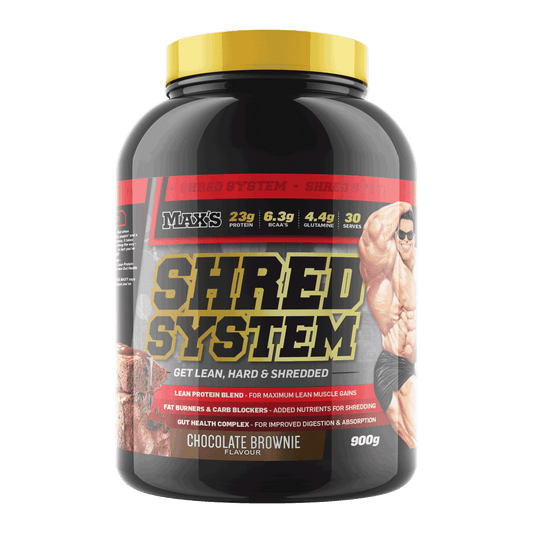 131 reviewsSale131 reviewsRegular price From $84.95 AUDRegular priceUnit price / per
131 reviewsSale131 reviewsRegular price From $84.95 AUDRegular priceUnit price / per$92.95 AUDSale price From $84.95 AUDSale -
 75 reviewsRegular price $64.95 AUDRegular priceUnit price / per
75 reviewsRegular price $64.95 AUDRegular priceUnit price / per$89.95 AUDSale price $64.95 AUDSaleFree
Product! -
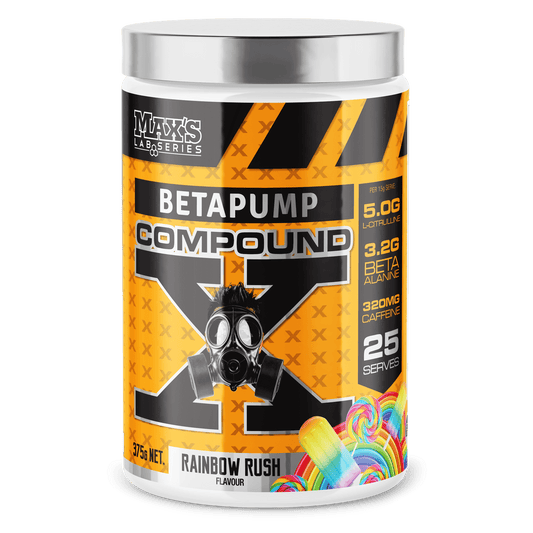 42 reviewsSale42 reviewsRegular price $64.95 AUDRegular priceUnit price / per
42 reviewsSale42 reviewsRegular price $64.95 AUDRegular priceUnit price / per$69.95 AUDSale price $64.95 AUDSale -
 73 reviewsSale73 reviewsRegular price From $89.95 AUDRegular priceUnit price / per
73 reviewsSale73 reviewsRegular price From $89.95 AUDRegular priceUnit price / per$101.95 AUDSale price From $89.95 AUDSale
What's New
-
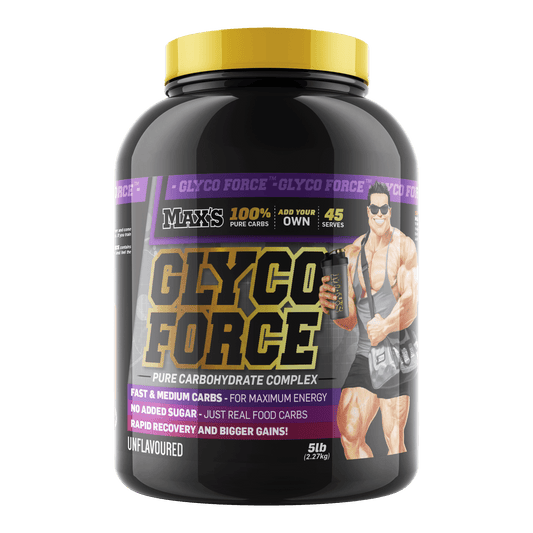 7 reviewsSale7 reviewsRegular price $54.95 AUDRegular priceUnit price / per
7 reviewsSale7 reviewsRegular price $54.95 AUDRegular priceUnit price / per$62.95 AUDSale price $54.95 AUDSale -
 12 reviewsSale12 reviewsRegular price $54.95 AUDRegular priceUnit price / per
12 reviewsSale12 reviewsRegular price $54.95 AUDRegular priceUnit price / per$59.95 AUDSale price $54.95 AUDSale -
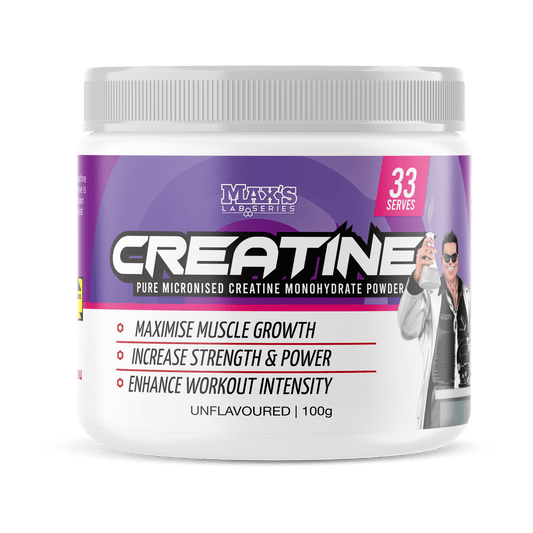 38 reviewsSale38 reviewsRegular price From $14.95 AUDRegular priceUnit price / per
38 reviewsSale38 reviewsRegular price From $14.95 AUDRegular priceUnit price / per$19.95 AUDSale price From $14.95 AUDSale -
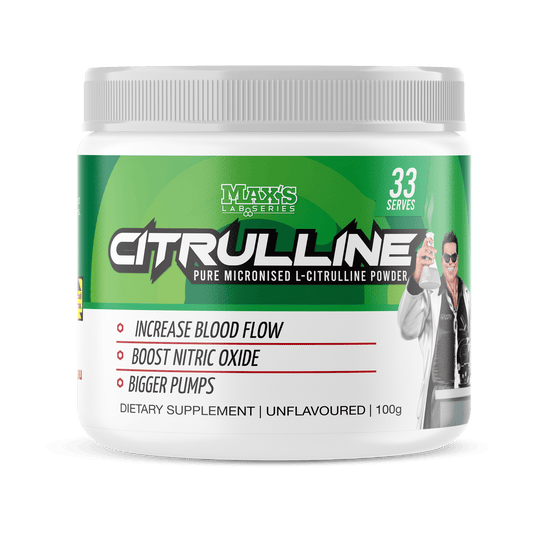 6 reviewsSale6 reviewsRegular price $19.95 AUDRegular priceUnit price / per
6 reviewsSale6 reviewsRegular price $19.95 AUDRegular priceUnit price / per$22.95 AUDSale price $19.95 AUDSale
Browse the full range
-
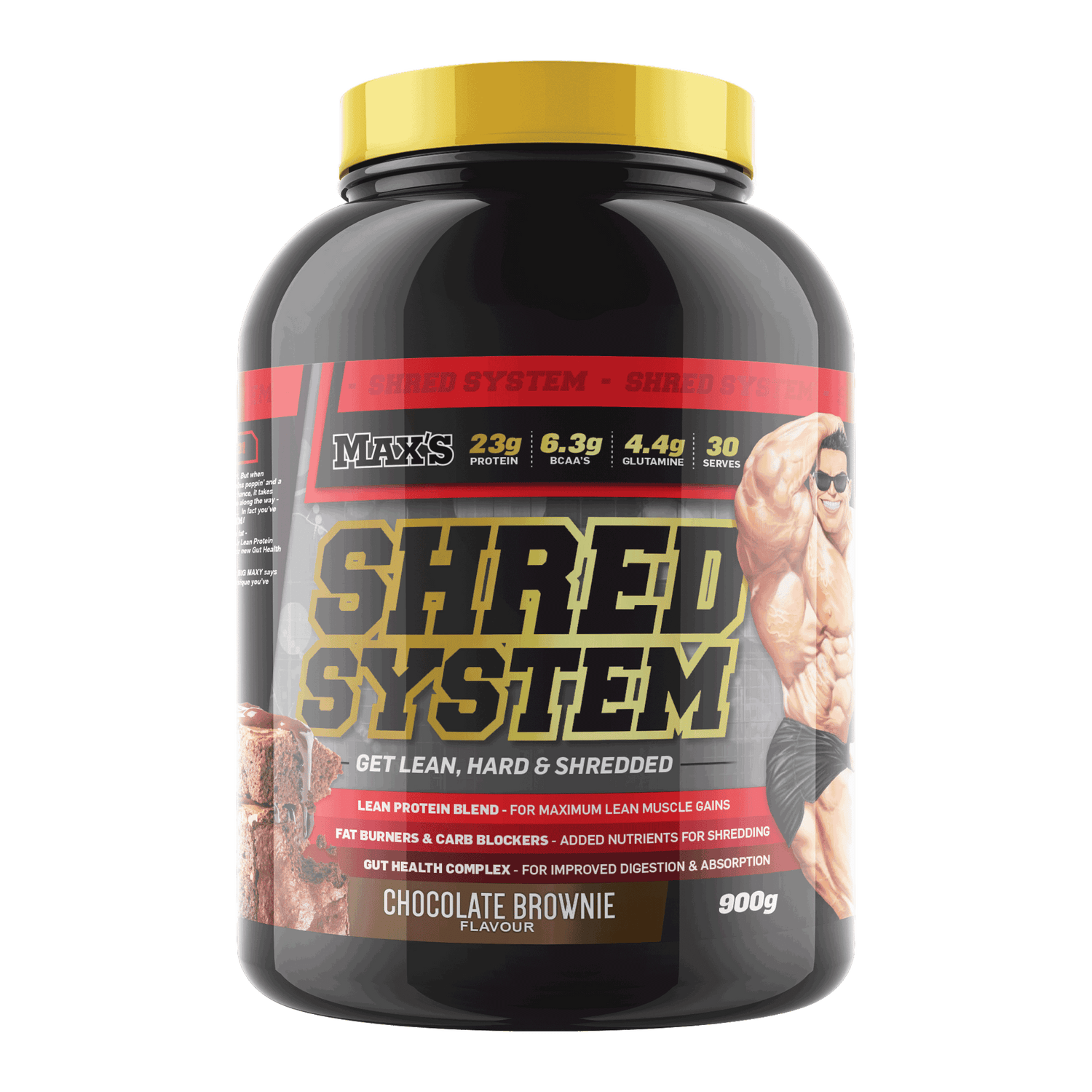
100% AUSTRALIAN-MADE PROTEIN POWDER Boosting your protein intake with protein powders is...
-
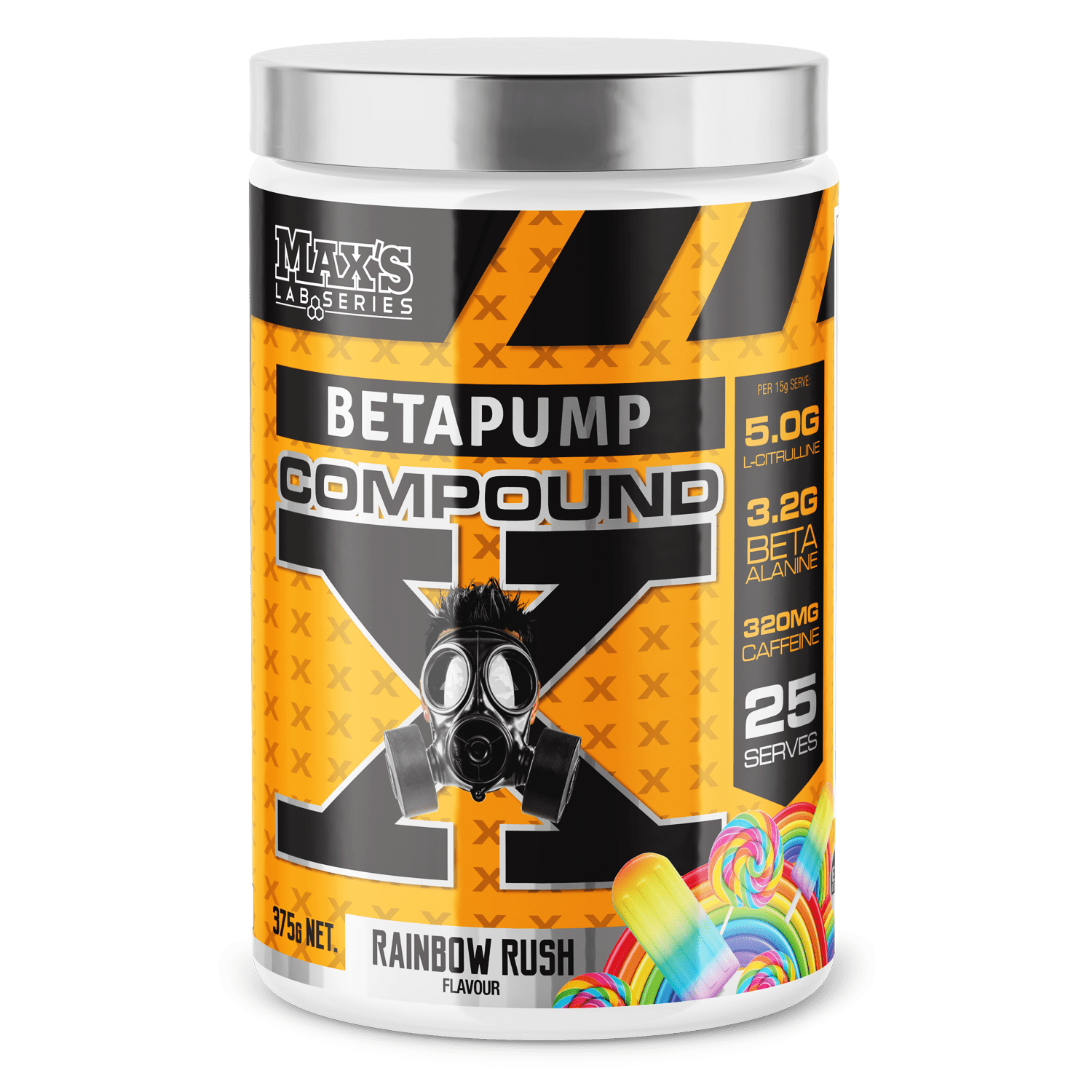
SUPPORT YOUR PERFORMANCE WITH HIGH-QUALITY VITAMINS & SUPPLEMENTS Whether you’re building muscle,...
-

FUEL UP DURING THE DAY WITH OUR HIGH-PROTEIN SNACKS High-protein foods are...
-

FUEL YOUR FITNESS As pioneers in sports nutrition, we know that...
-

Nutritional supplements are the perfect way to keep your body fuelled and...
What's new & special offers
-

Free 6 x cookies & our new shaker
Get the dealGet massive value with MAX'S SuperSize Ultra Value Bundle loaded with premium freebies. This pack includes the ultimate mass building combination of MAX’S SuperSize Ultra plus free 6 x delicious Muscle Meal Cookies and a premium shaker!
-

Free 100g Creatine With this SHRED value bundle
Shop nowScore a FREE 100g Creatine Monohydrate with Shred System 1kg and BETAPUMP Pre Workout
-

Free Creatine
Shop nowGet a free 100g MAX'S Creatine worth $19.95 with our Clean Mass Premium Protein & BetaPump Compound X bundle.
-

Free Acetyl L-Carnitine
Shop nowGet a free MAX'S Acetyl L-Carnitine worth $29.95 with our Shed System Premium Protein & SuperShred Bars bundle.
-

New Creatine Range
Browse the rangeShop our new pure creatine monohydrate range, starting from only $14.95!
-

Box of 12 Super Shred Bars
Shop nowGet a box of 12 super delicious MAX’S Super Shred bars with fat burners and carb blockers for just $54.95.
-

Shred System Premium Protein $79.95
Shop nowGet shredded fast with MAX's Shred System fat burning and carb blocking formula for just $79.95
-

Box of 12 Muscle Meal Cookies
Shop nowGet a box of 12 MAX’S Muscle Meal Cookies with mass building nutrients for just $54.95.
Why choose MAX’S protein powders & supplements?
-
Subscribe for 10% off your first order
Sign up for exclusive content, deals, the latest updates on MAX’S and Muscle TV, and more.
-
Free shipping on all orders over $99
Stock up on Australian gym supplements from MAX’S to save on shipping.
-
Flat rate shipping Australia-wide
Doesn’t matter where you are — all our customers pay the same amount for shipping!
-

Training Guides
Learn more / DownloadWorking hard but not getting results? A constant cycle of intense workouts and legitimate recovery is the key to muscle gain, and we’ve got the guide to make the gains easier than ever to achieve. Based on the expertise of our Pro Athletes, we’ll show you how to pack on some serious muscle or lose that excess mass the right way.
Download our training guide to access:- A free training plan curated by Team MAX’S Pro Athletes.
- Gym and home workout ideas.
- The exercises that work — and why.
- Free shred and mass guides based on your fitness goals.
- And more.
-

Nutrition Guides
Learn more / DownloadWhether you’re bulking or shredding, training from home or hitting the gym, we offer a complete nutrition guide with all the info you need to get the gains you’ve been working so hard for. From full meal plans to protein and supplement guides, we’ll show you how to gain clean mass, lose fat, and ultimately get jacked!
Download our free nutrition guide to access:- Tips and tricks from Team MAX’S Athletes on how they stay in incredible shape.
- A free nutrition plan explaining what to eat and how much to eat to reach your training goals.
- A supplement guide based on what our Pro Athletes take for success.
- And so much more.

Join the Gold Club
The MAX'S Gold Club is our customer loyalty program which rewards you for being a loyal MAX'S customer! Shop with MAX'S either in-store or online to earn discounts, exclusive deals, freebies and more!
FAQs
Are MAX’S supplements and proteins Australian-made?
Absolutely. From protein bars to powders and other supplements, all of our products are made right here in Australia by Australian workers. We source our ingredients from within Australia and from quality suppliers worldwide, delivering high-quality supplements that get results.
Do MAX’S supplements actually work?
Yes! We aim to help Aussie trainers achieve their fitness goals — we’d never sell a product that doesn’t get results. We research and develop all our products in-house in Melbourne, utilising the latest nutritional science from around the world. Plus, we make and test our products ourselves — if we think it won’t work, we won’t sell it.
Are MAX’S protein powders and supplements safe?
Yes! We are licenced by Dairy Australia and the Department of Agriculture, two organisations that control food manufacturing standards in Australia. Our products also comply with the Australian and New Zealand Food Standards Code, are HACCP certified, and are accredited to Export Quality.
We’re as obsessed with quality as we are about health and fitness. You can count on our proteins and supplements to get results — the safe way.
What kind of protein powders do you offer?
We offer a massive range of mass gainers, lean gainers, night proteins, shred proteins and whey proteins. Available in tasty flavours like chocolate, chocolate brownie, choc cookie dough, vanilla smoothie and banana cream, you’re guaranteed to find a protein powder you’ll actually want to drink.
How much protein powder should I take?
The recommended protein powder or supplement dosage varies depending on your needs and goals. It's crucial to follow the instructions on the label or consult a healthcare professional for personalised recommendations.
What is creatine monohydrate?
Creatine monohydrate is a naturally occurring compound found in small amounts in red meat and fish (as well as some of our top sellers!). When consumed, creatine monohydrate is converted into creatine phosphate, stored in the muscles and used to produce energy during high-intensity exercise.
Supplementing with creatine monohydrate increases muscle strength, power, and endurance for weightlifting, sprinting, and jumping. It’s one of the most well-researched and effective supplements for improving athletic performance and is widely used by athletes and bodybuilders!
I’m not sure what I need. Can you help?
Absolutely. We have full pages dedicated to your fitness goals, like shredding, strength and size building, increased performance, and recovery (amino acids and creatine) — here, you’ll find a great range of relevant protein powders, snacks and supplements to help you reach your fitness goals.
You’re also more than welcome to contact our team for help! We can help find the right products for the gains you need — whether it’s MAX’S protein bars, protein powder, pre-workout or recovery products.

About MAX'S Protein
MAX’S was established by Keith Ellis (an Australian bodybuilding champion) and Paul Kirkham (a nutritionist and sports science expert) in 1989. Thanks to their highly-effective protein powders and supplements, MAX’S has become one of Australia’s top sports nutrition companies! 100% Australian-made and owned, MAX’S gym supplements are made from the best quality ingredients available. We formulate our own products, source our own ingredients, and make our own products — guaranteeing consistent, great-tasting protein and supplements that get results.


























